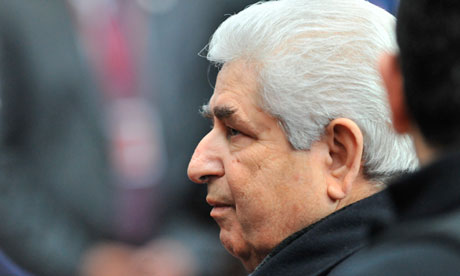Alexander Apostolides guardian.co.uk, Wednesday 19 December 2012 12.25 GMT
Christofias may rail at bankers over Cyprus's bailout, but it was bad governance that let to the country's rapid deterioration
The Cypriot president, Demetris Christofias, in Brussels last week for an EU leaders summit. Photograph: Georges Gobet/AFP/Getty Images
Cyprus should be receiving approximately €17bn from the so-called troika in January, subject to a series of measures that introduce austerity while leaving questions of reform unanswered. This breaks down as follows: €1bn is set to cover the government budget deficit; €6bn is earmarked to rollover short-term debt since the current government refused to borrow long-term (hoping for better interest rates in 2013); and €10bn is needed for the troubled banking sector to be in compliance with ECB requirements on capitalisation.
Although the bailout is far smaller in absolute terms than other eurozone packages (the current tranche given to Greece is far larger), the bank bailout looms large and President Demetris Christofias, who is not running for re-election, rails that this is the bankers' fault, singling out in particular, the former head of the Cypriot central bank, Athanasios Orphanides.
Cyprus reached this sorry state surprisingly rapidly, and despite his protestations, Christofias's government bears most of the blame. First, Christofias wields significant power with very limited constraints. He could and did made decisions without asking parliament, his finance ministers or the former governor of the central bank. He has the right to do this, but it is now mainly his decisions that led us to this crisis: the president's inability to listen to advice was a key factor in the rapid deterioration of Cypriot finances.
His decision to store rather than destroy weapons bound for Hezbollah and confiscated by Cyprus led to the weapons exploding in 2011, taking down the largest Cypriot power station. The large increases in the cost of generating electricity are preventing the recovery of the small business sector, which comprises most of the economic activity in Cyprus. While the president could not predict that the weapon containers would blow up, he must take responsibilty for the decisions made in relation to the economic sector. These have had depressingly predictable results.
Cypriot banks were heavily exposed to the Greek market, in particular to Greek government debt. When the Marfin Laiki bank (now the bank that needs a bailout the most) announced in 2009 that it was moving its central offices to Greece, thus making it subject to Greek rather than Cypriot regulator jurisdiction, Christofias rushed to support the bank president in the bank's disagreement with the central bank governor. The political pressure paid off: the bank stayed and now it requires €3bn of government aid to remain as a going concern.
Close to half of the bank bailout is related to the decision to haircut Greek government bonds at an EU level. The president could have vetoed a resolution on the haircut until Cypriot bank losses were integrated in the Greek financial sector bailout. This measure alone would perhaps ensure the current viability of the banking system. Cyprus was locked out of international markets because of the banking system viability fears, so the government successfully arranged a €2.5bn loan from the Russian government. Yet the loan was spent on regular government expenditure rather than being used to safeguard the banking sector.
In addition, the decision by the current government to move the debt issuance and monitoring department from the central bank to the ministry of finance meant that debt management became political. The then finance minister, Charilaos Stavrakis, borrowed only short-term in order to avoid austerity measures, and €6bn is needed today as a result of that decision. More worryingly this government, like all governments before it, decided to bestow patronage, despite the economy taking a nosedive. In 2009, government expenditure rose by 7.8% even though revenues fell by 8.5%. Despite a sluggish recovery, government expenditure only fell in 2011 when Cyprus entered a double-dip recession: this irresponsible spending led to an unsustainable funding gap which the government created.
As well as the above there are significant and long-term failures of governance that neither this nor any other government of Cyprus has ever attempted to tackle. Here all Cypriot stakeholders have a share of the blame as they all took part: parliament, business, bankers, unions and political parties. The government, health and education sectors are bloated by low-productivity workers, made worse by the fact that the incentive system within government is broken. The payout system of public wages has no relationship to the economic cycle, adding a tremendous strain on government finances in a recession. The largest government union is not working on purely democratic principles, and its stance has made it very difficult for any government to correct a system in desperate need of reform.
The cosy nexus of bank executives and big business produced uncompetitive market outcomes and were allowed to get away with unfair practices by the broader political spectrum. In the end the government of President Demetris Christofias will go, but the long-term failures of governance will remain. That is what Cyprus will need to tackle in order to be competitive again.
![The [Greek] European Tragedy](https://blogger.googleusercontent.com/img/b/R29vZ2xl/AVvXsEiWKI5s90SFm1wWTk6bs4p7CgslaC2SnYPsrZhb-B-smOufNNCSxCvpBLI9hOB-LsXZjir_PNmEiMk2-E62F3xkg96IoC6QFAaZAnPRTVH340IN9WBRmWJqPkjWlgyRj3zpALp7h6hvA58/s920/GkBack_new.jpg)

